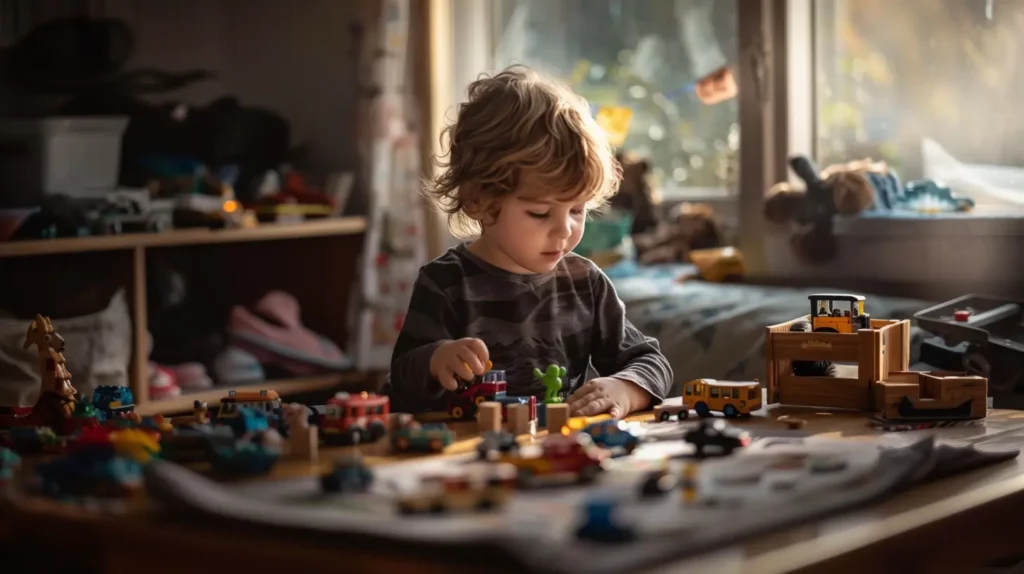Toys are not just objects that kids play with – they hold a special significance in a child’s life. Toys are the tools that enable children to explore their imagination, creativity, and curiosity. They provide a way for kids to make sense of the world around them and express themselves in a safe and fun way.
Toys can take on many different forms, from dolls and stuffed animals to action figures and building blocks. Each type of toy offers unique benefits to a child’s development. For example, dolls and stuffed animals can help children develop empathy and social skills as they learn to care for their toys as if they were real people. Action figures, on the other hand, can inspire imaginative play and storytelling as children create their own adventures with their favorite characters.
Toys also offer an escape from reality for children. They allow kids to immerse themselves in their own worlds where anything is possible. This kind of imaginative play is crucial for childhood development, as it helps kids develop problem-solving skills, creativity, and critical thinking abilities.
Furthermore, toys provide a sense of comfort and security for kids. Many children form strong emotional attachments to their favorite toys, which can act as sources of comfort during times of stress or anxiety.
In addition to these benefits, playing with toys also promotes physical activity and coordination. Whether it’s riding a bike or playing catch with a ball, physical play is important for maintaining good health and developing gross motor skills.
The Benefits of Having Fewer Toys for Your Child’s Development
While toys are essential for a child’s growth and development, having fewer toys can actually be more beneficial than being surrounded by a large number of toys. When children have too many toys to choose from, it can become overwhelming and they may struggle to fully engage with each toy. This can hinder their creativity and limit their opportunities for imaginative play.
Additionally, children may become focused on acquiring more toys rather than enjoying the ones they already have. Having fewer, high-quality toys that are rotated regularly can encourage children to delve deeper into their imaginations and form stronger emotional connections with their favorite toys. In this way, having fewer toys can actually enhance a child’s playtime experience and promote healthy development.
Here are 10 benefits of having fewer toys:
Encourages creativity and imagination
Having fewer toys can be a great way to encourage children’s creativity and imagination. When there are fewer options available, children are forced to use their imaginations to come up with new games and activities to play. This can lead to more unique and creative playtime experiences that help children develop important skills such as problem-solving, critical thinking, and innovation. By relying less on pre-made toys and instead using their own imaginations, children may also develop a greater appreciation for the power of creativity in their lives.
Develop a better attention span
Having too many toys can be overwhelming for children and lead to shorter attention spans. When there are fewer toys available, children are able to focus on the ones they have for long periods of time. This allows them to fully engage with each toy and explore its different features and possibilities. By developing a longer attention span, children may also become better at focusing on tasks and activities in other areas of their lives, such as school or extracurricular activities. Ultimately, limiting the number of toys available can be a great way to help children develop important skills that will serve them well throughout their lives.
Promotes sharing and cooperation
Having fewer toys can also promote sharing and cooperation among children. When there are only a limited number of toys available, children must learn to share and take turns in order to play with them. This helps them develop important social skills such as empathy, communication, and cooperation. By working together to share the available toys, children may also develop stronger relationships with one another and learn how to resolve conflicts more effectively. Ultimately, promoting sharing and cooperation through limited toy availability can help children develop important life skills that will serve them well into adulthood.
Reduces clutter and stress
Another benefit of having fewer toys is that it can reduce clutter in the home. When there are too many toys, they can easily become scattered and create a sense of chaos and disorder. This can be stressful for both children and parents, who may feel overwhelmed by the mess. By limiting the number of toys available, parents can help create a more organized and stress-free environment for their children to play in. Having fewer toys means that children may be more likely to take care of them and keep them in good condition, which can further reduce stress levels for parents.
Saves money
Buying toys can be expensive, and constantly purchasing new ones can quickly add up. By limiting the number of toys available, parents can save money on purchases and put those funds towards other things such as experiences or education. Additionally, having fewer toys teaches children to appreciate what they have rather than constantly wanting more. This can help develop a sense of gratitude and contentment, which are important values to instill in children.
By learning to value what they have rather than always seeking out something new, children may also become more resourceful and creative in finding ways to play with the toys they do have. Ultimately, limiting toy availability can be a cost-effective way to teach children important life skills while also reducing unnecessary spending.
Encourages outdoor play
When there are too many indoor distractions, such as electronic devices or an overwhelming number of toys, children may be less likely to engage in physical activity and spend time outside. However, when there are fewer indoor options available, children may naturally gravitate towards outdoor play and exploration. This can help promote physical health and development, as well as a love for nature and the outdoors.
Spending time outside has been shown to have numerous mental health benefits for both children and adults, including reduced stress levels and improved mood. By limiting toy availability and encouraging outdoor play, parents can help their children develop healthy habits that will benefit them for years to come.
Improves social skills
When children have an overwhelming number of toys, they may be more inclined to engage in solitary play and spend less time interacting with others. However, when there are fewer options available, children may seek out social interaction with peers and siblings as a way to entertain themselves. This can help develop important social skills such as communication, cooperation, and conflict resolution.
Playing with others can also promote empathy and understanding towards others, which are important values to instill in children from a young age. By limiting toy availability and encouraging social interaction, parents can help their children develop valuable life skills that will serve them well in the future.
Fosters independence
When there are too many toys available, children may rely on them to provide instant entertainment and stimulation, rather than learning how to entertain themselves. However, when there are fewer options available, children may be forced to use their creativity and imagination to come up with new games and activities. This can help them develop problem-solving skills and a greater sense of independence.
Additionally, learning how to entertain themselves can also promote self-confidence and a sense of autonomy, which are important traits for children to develop as they grow older. By limiting toy availability and encouraging independent play, parents can help their children learn valuable life skills that will serve them well throughout their lives.
Enhance problem-solving skills
When there are limited resources available, children may need to get creative in finding solutions to problems or creating new games. This can help them develop important problem-solving and critical-thinking skills, as they learn to use their imagination and resourcefulness to overcome challenges. Being able to come up with new ideas and solutions on their own can promote self-confidence and a greater sense of independence in children. By limiting toy availability and encouraging creative play, parents can help their children develop valuable life skills that will benefit them throughout their lives.
Develops gratitude
In a world where material possessions are often seen as a measure of success and happiness, it’s important for children to learn that true happiness doesn’t come from accumulating more and more things. By having fewer toys, children may learn to appreciate and take better care of the ones they do have, rather than constantly seeking out new possessions. This can promote a sense of gratitude and contentment in children, which are important values to cultivate as they grow older. By encouraging children to focus on experiences rather than possessions, parents can help their children develop a healthy perspective on life and foster a greater appreciation for the people and things that truly matter.
Final thought
In summary, having fewer toys can promote healthy childhood development by encouraging creative play, problem-solving skills, critical thinking, and gratitude. It also fosters a simpler and more fulfilling childhood experience by focusing on experiences rather than possessions. By limiting toy availability, parents can help their children develop important life skills while promoting a greater appreciation for the things that truly matter in life. Ultimately, having fewer toys can lead to a more well-rounded and balanced childhood experience that sets the foundation for a happy and healthy adulthood.


